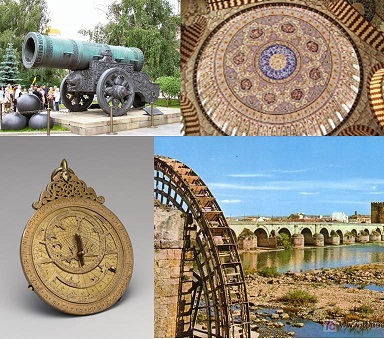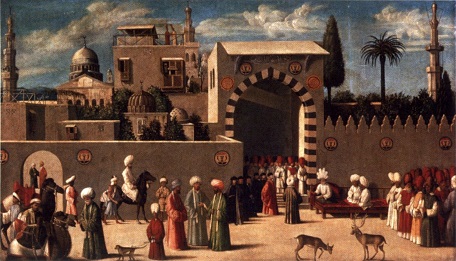(1).jpg)
WHY DID MUSLIMS FALL BEHIND IN SCIENCE?
The contribution of the Islamic world to various branches of science until the 15th century is quite remarkable. It can also be understood from terms such as algebra (from Arabic al-jabr) and alchemy (from Arabic al-kimiya). This contribution is at an undeniable level not only in science but also in fields such as art, trade and politics. Why did the Islamic world lose its scientific dominance to Europe? What were the reasons for this decline?

The following are claims by Europeans: "The negative attitude of Islamic scholars led to this decline. If it had not been for scholars like Abu Hasan al-Ash'ari and Abu Hamid al-Ghazali, discoveries and inventions could have occurred in the Islamic world. The West managed to overcome the scholastic philosophy, the East did not". In fact, what they mean is the stance of al-Ash'ari against the Mu'tazila sect, and the stance of al-Ghazali against the philosophers. However, the developments in the scientific discipline continued to increase even after al-Ghazali. The arguments between religious scholars and philosophers were not over rational sciences. They were about understanding the essence of the religion.
It is true that after the 16th century, the difference between the Islamic world and the West in terms of scientific developments gradually increased. However, it would be unfair to say that this is due to the opposition of Muslim scholars. This was a supply and demand issue. If more time and energy could have been alloted to science and technology in the Islamic world, whose political and economic power was gradually decreasing, rational sciences would have continued to advance uninterruptedly, as it had been in the golden age of Muslims. During this period, a large number of mathematicians, astronomers, physicists, engineers and other scientists were meeting the needs of the society and the state.
The second matter that the Western world criticizes is that madrasas were focusing on theology and law education. However, the education of rational sciences in the Islamic world was conducted separately. Astronomy and mathematics were taught by mathematicians and astronomers in observatories, which had a library equipped with books in these sciences and where instruments related to observations were constantly used. Likewise, medicine was taught in a hospital, as it should be. For this reason, at the time of political and economic decline, law and theology education continued in proportion to the need, but on the other hand, the education of the rational sciences did not progress much. Taking into consideration that integration with the West was inevitable in the modern age, modern schools were established in which these sciences were taught.
The jurist, historian and sociologist Ibn Khaldun attributed this lack of development to political and economic reasons and said that "science thrives in rich societies". If a city weakens, loses its prestige and its population dwindles, the professions will also decrease until they disappear, as they are not supported financially. The populous and prosperous cities of the first century of Islam, such as Baghdad, Cordoba, Kairouan, Basra and Kufa, were centers of civilization and science. When their populations decreased, their prosperity, civilization, thinking and science disappeared and moved to other Islamic countries such as Iran and Turkestan. The rapid advancement of science coincides with times of increasing economic activity and technical progress. The path of science is the same as that of commerce and industry from Egypt and Mesopotamia to Greece, from Andalusia to Renaissance Italy, to the Netherlands, and from there to England during the Industrial Revolution. When society collapses, science stops progressing and then ceases to exist. Science requires prosperity and security.
By the end of the 15th century, science had reached a point where further progress was very difficult or even impossible. Besides, there had been no significant scientific progress either in the Islamic world or in Medieval Europe until this period. The old order that caused this stagnation had to be overthrown for a massive transition to progress. The enrichment of Europe through discoveries and its population growth brought about this transition.
Reasons for the Decline in Scientific Progress

1- Structure of the Soil: Most of the Islamic lands consist of barren or semi-barren lands, steppes and deserts with little habitable land. The Umayyads and the Abbasids carried out the agricultural revolution by giving importance to irrigation systems. Due to the weakening of the central government over time, irrigation facilities have been neglected. The fields became barren or turned into swamps after the Mongol invasion.
2- Nomadic People: When the central government weakened, the nomadic people prevailed, causing disorder and anarchy afterwards. As irrigation systems collapsed and irrigated lands turned into pastures or swamps, the nomadic people increased the areas they controlled. This led to the depopulation of Iraq and Syria from the 13th century to the modern era.
3- Natural disasters: In the Middle Ages, natural disasters in Islamic lands caused social and economic collapse. The low water levels in the Nile caused a severe famine in 968 and 600,000 people died. More famines and epidemic diseases followed. The Black Death (the Plague), the greatest disaster of the Middle Ages, devastated the Islamic world more than Europe. The populations of Egypt, Syria, and Iraq dropped to a third of what they had been. Agricultural and industrial production collapsed. Military power weakened in parallel with this.
4- Geographical Position: From the Crusades to modern times, its geographical position had made the Islamic lands a constant target of external exploitations and encroachments. Situated in the middle of the East and the West, and with its flat topography, the Islamic lands were defenseless in every way. Islands like Japan and Britain had a strategic advantage in this respect.
5- The Crusades: In order to take Jerusalem and the holy places from the Muslims, seven crusades were organized to the Islamic world between 1096-1291. Massacres were committed against the Muslim population of the captured cities. Along with the soldiers of the occupying armies, adventurers, merchants and travelers who came with them were settled there. There were economic reasons behind the expeditions in which religion was used as a psychological catalyst. The population of Europe was growing. Compared to the 38.5 million population in Europe, the population in the Islamic lands did not exceed 12.5 million. The Crusades were the first experiment of imperialism. Population and production increased in Western Europe. The increase in profits led to capital accumulation. The Crusades provided great opportunities for the expansion of northern Italy's major maritime cities such as Venice, Pisa, and Genoa. In contrast, the efforts of muslims to withstand and expel the Crusades, which lasted for two centuries, collapsed the local economies and weakened the Arab cities.

6- Mongols: While the Muslim world was preoccupied with the Crusaders, another horrific invasion came from the East. Genghis Khan united the nomadic Mongols and attacked Islamic lands. From 1220 onwards, Islamic cities fell into the hands of the Mongols and they virtually razed everything to the ground. The Abbasid Caliphate came to an end with the occupation of Baghdad. This marked the end of the golden age in Islamic civilization. The most devastating effect of this invasion was the significant decline in the Muslim population. The number of people massacred in Baghdad is close to 2 million. The population dropped to one tenth. Libraries containing hundreds of thousands of books also suffered from these disasters.
7- Trade Routes: Due to geographical discoveries, trade routes such as the Silk Road lost their importance. Income distribution between Europe and Islamic lands changed drastically. The center of international trade shifted from the Mediterranean and India to the Baltic and the Atlantic. The colonies, including Islamic lands, became raw material producers. Thanks to these the colonies, Europe carried out the industrial revolution.
8- Capitulations: The Mamluk and Ottoman sultans thought that the privileges granted to foreigners would benefit the economy. With the weakening of political power, capitulations backfired with disastrous effects. This led to suffering under foreign economic domination. Cheaper European goods invaded the markets. Small industries collapsed.
9- Military Interventions: The reform projects of the Muslim rulers, who recognized the economic weakness, were disrupted by the coups that Europe supported domestically at first, and then by foreign military interventions.
10- Overexpansion: By pursuing high ideals, Muslims reached broad borders. However, they did not have the population and financial power to hold the lands they conquered. In the mid-19th century, at a time when population was directly proportional to power, the population of the Ottoman Empire was 17 million, while the population of Western Europe was 190 million. Russia and Eastern Europe had a population of 274 million. The populations of England, Spain-Portugal, Italy, Germany and Austria were 30, 37, 20, 24 32 and 32 million respectively.
On this subject, Prof. Dr. Ahmed Yusuf Hassan has an excellent article entitled “Factors Behind the Decline of Islamic Science After the Sixteenth Century”.
Önceki Yazılar
-
THE OTTOMAN DYNASTY AND QURAYSH9.07.2025
-
"WOE TO THE ENEMIES OF THE REVOLUTION!" What Was The People’s Reaction To The Kemalist Revolutions?2.07.2025
-
DEATH IS CERTAIN, INHERITANCE IS LAWFUL!25.06.2025
-
THE SECRET OF THE OTTOMAN COAT OF ARMS18.06.2025
-
OMAR KHAYYAM: A POET OF WINE OR THE PRIDE OF SCIENCE?11.06.2025
-
CRYPTO JEWS IN TURKEY4.06.2025
-
A FALSE MESSIAH IN ANATOLIA28.05.2025
-
WAS SHAH ISMAIL A TURK?21.05.2025
-
THE COMMON PASSWORD OF MUSLIMS14.05.2025
-
WERE THE OTTOMANS ILLITERATE?7.05.2025